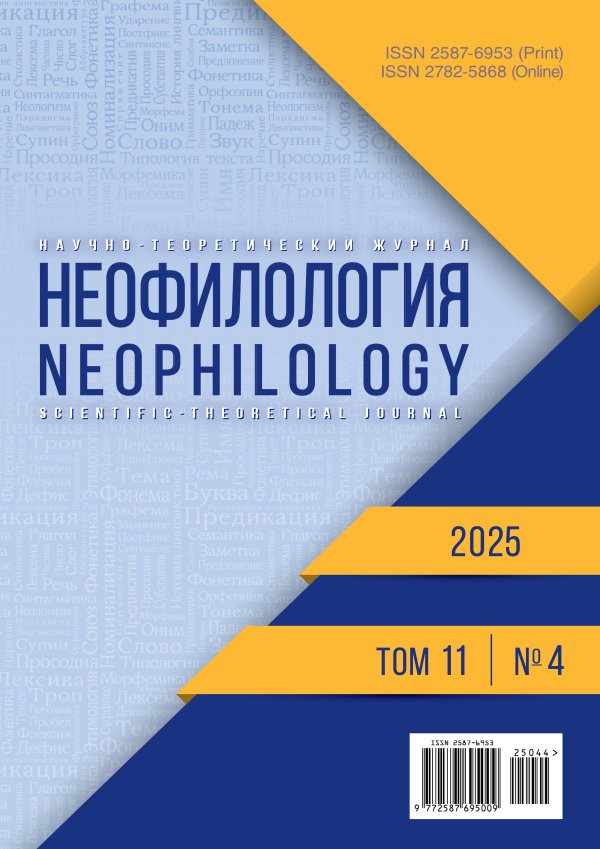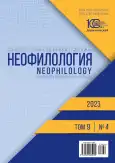Фольклорные персонажи в топонимах Шотландии: лингвокогнитивный аспект
- Авторы: Пенцова М.М.1
-
Учреждения:
- Московский городской педагогический университет
- Выпуск: Том 9, № 4 (2023)
- Страницы: 789-798
- Раздел: ЯЗЫКИ НАРОДОВ ЗАРУБЕЖНЫХ СТРАН (ГЕРМАНСКИЕ ЯЗЫКИ)
- URL: https://journal-vniispk.ru/2587-6953/article/view/295777
- DOI: https://doi.org/10.20310/2587-6953-2023-9-4-789-798
- ID: 295777
Цитировать
Полный текст
Аннотация
Рассмотрены шотландские топонимы, имеющие в своём составе наименования и имена фольклорных персонажей. Цель исследования – установить, какие знания о фольклорных персонажах отразились в шотландской топонимии и какие механизмы номинации задействованы в их формировании. Рассмотрены шотландские топонимы, содержащие наименования географических объектов, наименования и имена фольклорных персонажей. Источником эмпирического материала послужили шотландские топонимические словари, работы зарубежных исследователей и интернет-ресурсы. Для достижения поставленной цели применялись метод целенаправленного поиска топонимических единиц, метод когнитивной матрицы, лексико-семантический и этимологический анализ, а также культурный анализ. В ходе исследования были рассмотрены топонимы, во внутренней форме которых содержатся имена великанов Saxa и Herman и наименования мифических созданий – фейри, боглов и брауни. В когнитивных основаниях рассмотренных топонимов находятся когнитивный контекст фольклорные персонажи и характеристики концепта места: обитатель, качество и событие. Формирование топонимов происходит за счёт метафорических и метонимических переносов. Сделаны выводы: в когнитивных основаниях рассмотренных топонимов отражаются такие знания о фольклорных персонажах, как их место обитания, способности фольклорных персонажей и связанные с ними действия и события, происходящие на месте. Метафорические и метонимические переносы основаны на сравнении знаний о внешних свойствах персонажа и географического объекта и знаний о чувствах, вызываемых происходящим на объекте, а также на соотнесении наименования или имени фольклорного персонажа, качества объекта, приобретённого благодаря фольклорному персонажу, и названия объекта.
Об авторах
М. М. Пенцова
Московский городской педагогический университет
Автор, ответственный за переписку.
Email: p-maria@rambler.ru
ORCID iD: 0000-0001-5016-7800
старший преподаватель кафедры английской филологии
105064, Российская Федерация, г. Москва, Малый Казенный пер., 5БСписок литературы
- Watson W.J. The History of the Celtic Place-Names of Scotland. Shannon: Irish University Press, 1973. 558 p.
- Nicolaisen W.F.H. Scottish Place-Names. Edinburgh: John Donald, 2011. 320 p.
- Шадикова А.В. Ассоциативное восприятие топонимов Шотландии // Когнитивные исследования языка. 2017. № 30. С. 327-330. https://elibrary.ru/zmqhjf
- Щербак А.С. Универсальное свойство урбанонимической категории // Неофилология. 2018. Т. 4. № 13. С. 5-11. https://elibrary.ru/yvlvop
- Мартыненко И.А. О целесообразности введения термина «когнитивная топонимика» // Томский журнал лингвистических и антропологических исследований. 2020. № 3 (29). С. 142-150. https://doi.org/10.23951/2307-6119-2020-3-142-150, https://elibrary.ru/kmqipp
- Reszegi K.A. Cognitive approach in onomastics: some notes on metaphorical place-names // Problems of Onomastics. 2022. Vol. 19. № 1. P. 235-244. https://doi.org/10.15826/vopr_onom.2022.19.1.012, https://elibrary.ru/uzsqiz
- Щербак А.С. Когнитивные основы региональной ономастики. Тамбов: Тамб. гос. ун-т им. Г.Р. Державина, 2012. 319 с. https://elibrary.ru/vdieml
- Андреев А.А. Фольклор и паранаука в русской культуре // Вестник славянских культур. 2020. № 56. С. 68-74. https://doi.org/10.37816/2073-9567-2020-56-68-74, https://elibrary.ru/bawjsw
- Дранникова Н.В. «Фольклор»: к вопросу об истории употребления термина и его значения в русской науке // Труды Карельского научного центра Российской академии наук. 2015. № 8. С. 39-45. https://doi.org/10.17076/hum117, https://elibrary.ru/ukphgl
- Исаева Т.Б. Валлийские топонимы как отражение лингвистического и этнокультурного наследия кельтов на территории Уэльса // Вестник Красноярского государственного педагогического университета им. В.П. Астафьева (Вестник КГПУ). 2020. № 4 (54). С. 133-142. https://doi.org/10.25146/19950861-2020-54-4-249, https://elibrary.ru/rywwki
- Болдырев Н.Н. Когнитивная природа языка. Москва; Берлин: Директ–Медиа, 2016. 251 с. https://elibrary.ru/wkefkn
- Денисенко О.В. Когнитивные основы топонимики // Опыт и перспективы обучения иностранным языкам в евразийском образовательном пространстве. 2020. № 5. С. 102-107. https://elibrary.ru/rtwqlr
- Болдырев Н.Н. Язык и система знаний. Когнитивная теория языка. 2-е изд. М.: Изд. дом ЯСК, 2019. 480 с. https://elibrary.ru/oxliyg
- Болдырев Н.Н. Когнитивная основа лексических категорий и их интерпретирующий потенциал // Вопросы когнитивной лингвистики. 2013. № 2 (35). С. 5-12. https://elibrary.ru/pyuqtp
- Новицкая И.В. Теория концептуальной метафоры и развитие альтернативных концепций в рамках когнитивного направления метафорологии (по материалам современной англистики) // Язык и культура. 2019. № 46. С. 76-101. https://doi.org/10.17223/19996195/46/5, https://elibrary.ru/qcyzml
- Рахманкулова С.Е. Концептуальная метонимия на уровне структуры высказывания (на материале английского языка) // Вестник Балтийского федерального университета им. И. Канта. Серия: Филология, педагогика, психология. 2018. № 1. С. 5-10. https://elibrary.ru/ysxktb
- Ощепкова В.В. Спеллонимы в системе мифонимов британской народной сказки // Вестник Московского государственного областного университета. Серия: Лингвистика. 2018. № 2. С. 73-87. https://doi.org/10.18384/2310-712X-2018-2-73-87, https://elibrary.ru/xuwlpv
- Ощепкова В.В. Особенности формирования ономастикона британской народной сказки // Вестник Томского государственного университета. Филология. 2019. № 62. С. 135-148. https://doi.org/10.17223/19986645/62/9, https://elibrary.ru/qffiou
Дополнительные файлы










